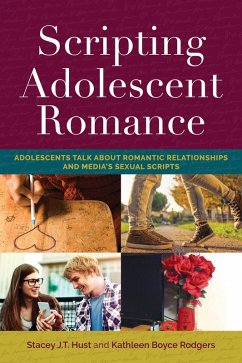Adolescents and emerging adults today spend an estimated seven hours daily attending to media. The media teens attend to commonly present relationships between men and women as a "game" or "competition" in which women seduce through their physical appearance and the masculinity of men is defined through sexual conquest. A growing body of research suggests that viewing this sexualized media may contribute to adolescents' and emerging adults' understanding of and behaviors around romantic and sexual relationships. Using social cognitive theory of gender development, scripting theory, and heterosexual script theory as a framework, Scripting Adolescent Romance presents methods and analyses of data from in-depth interviews with 16 high school and young college students, and focus groups with over 100 individuals in this age group. Findings provide a rarely seen view inside youths' private spaces-their bedrooms and their social media spaces. In often highly-personal conversations, youth provide in-depth information about how they understand and navigate virginity, romantic relationships, sexual situations, and interpersonal violence. Their discussions of "Netflix and chill," Facebook stalking, and the scorecard script illuminate aspects of romance and sex that may be uniquely characteristic of today's young people. This book is a must-read for parents of adolescents, and promises to be an enjoyable, insightful text for classes about media effects, adolescent development, gender roles, and sexual health.
Dieser Download kann aus rechtlichen Gründen nur mit Rechnungsadresse in A, D ausgeliefert werden.
"This carefully researched book offers many new insights into the role of entertainment media in the development of sexual and romantic scripts among youth. It provides a comprehensive overview for scholars and is an accessible read to all." Patti M. Valkenburg, University of Amsterdam
"This is a wonderful, rich, and thoughtful book that brings a fresh perspective to four decades of research on the effects of media portrayals on emerging sexuality. One unique feature is that the authors centered their analyses on gendered sexual scripts, the different sexual norms and expectations for girls and boys. Their analyses illustrate beautifully how these sexual scripts are present both in the media and in society, and frequently determine and constrain our choices, expectations, and perceptions in romantic and sexual relationships. A second unique feature is that the book tells a nice developmental story, comparing perceptions and experiences of high school students and college students. A chief contribution is the authors' use of qualitative data, gathered through three methods, which allow us to see in concrete ways how young people perceive and negotiate the media's sexual content. Particularly poignant were examples of young people's accepting or rejecting specific media messages based on whether they resonate with their own experiences. As scholars, we often assume this happens; Hust and Rodgers captured these elusive processes. Their astute analyses make this book an easy and captivating read for scholars, students, educators, and parents." L. Monique Ward, Professor of Psychology, University of Michigan


